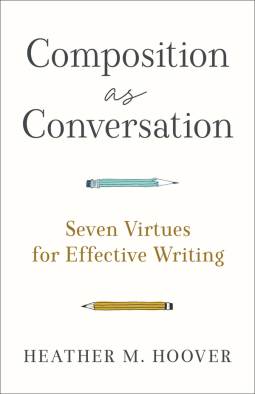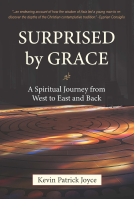
Composition as Conversation
Seven Virtues for Effective Writing
by Heather M. Hoover
This title was previously available on NetGalley and is now archived.
Send NetGalley books directly to your Kindle or Kindle app
1
To read on a Kindle or Kindle app, please add kindle@netgalley.com as an approved email address to receive files in your Amazon account. Click here for step-by-step instructions.
2
Also find your Kindle email address within your Amazon account, and enter it here.
Pub Date 27 Jun 2023 | Archive Date 11 Jul 2023
Baker Academic & Brazos Press | Baker Academic
Talking about this book? Use #CompositionasConversation #NetGalley. More hashtag tips!
Description
Written by a teacher with more than fifteen years of experience in the college writing classroom, Composition as Conversation explores what happens when the art of conversation meets the art of writing. Heather Hoover shows how seven virtues--including curiosity, attentiveness, relatability, open-mindedness, and generosity--inform the writing process and can help students become more effective writers. She invites writers of all skill levels to make meaningful contributions with their writing.
This short, accessible, and instructive book offers a reflective method for college-level writing and will also work well in classical school, high school, and homeschool contexts. It demystifies the writing process and helps students understand why their writing matters. It will energize teachers of writing as they encourage their students to become careful readers and observers, intentional listeners, and empathetic arguers. The book also provides helpful sample assignments.
Advance Praise
“Hoover’s straightforward, accessible approach encourages students to craft their own writing processes by choosing topics that interest them, being actively curious, and listening to others who are also interested (as opposed merely to ‘waiting to talk’ themselves). Drawing on insights from Henry David Thoreau to Jean Rhys to Joan Chittister to Steven Pinker to The Office, Hoover helps equip students to resist mere noise generated in the age of social media by engaging in academic writing as a living conversation that can produce real change for good in the world. Complete with useful exercises and examples of how to put the method into practice, the text makes a significant contribution to first-year composition pedagogy.”—Jill LeRoy-Frazier, professor of cross-disciplinary studies, East Tennessee State University
“Writing well requires certain kinds of human beings to do the writing, and the kinds of human beings who write well only emerge by writing well. Heather Hoover solves this Riddle of the Sphinx not by forsaking writing but by teaching writing, and this book without relent returns us, her readers, to reflect on the dynamic nature and capacities and virtues of those human beings whom we teach. We who teach writing, whether in college classrooms or anywhere else human community happens, do well to heed.”—Nathan P. Gilmour, professor of English, Emmanuel College
“An absolute gem of a resource! It’s not surprising that Hoover’s fresh reframing of composition as conversation transformed the level of student engagement and investment in their writings. Applying the virtues of being curious, attentive, relatable, on topic, engaging, open-minded, and generous to meaningful research, in-class discussions, and academic writing inevitably transferred into their daily lives. In an era where divisive discord dominates the public arena and misinformation saturates the media, our nation needs citizens embracing the critical and creative skills this book encourages faculty to teach. The appendix also offers excellent additional materials to reproduce. As a former university director of writing, I would have loved to have given this valuable resource to any adjunct faculty and teachers of writing preparing their classes! She’s a wise sage!”—Linda Lawrence Hunt, emerita director of Whitworth University’s Writing Program; coauthor of In the Long Run: A Study of Faculty in Three Writing-across-the-Curriculum Programs
“Writing is an art, a craft, and a struggle. By reframing composition as conversation, however, Heather Hoover directs our attention to the way it is communication and thus is most essentially a question of how we relate to people. In the process, she does something miraculous: she makes writing easier. Essential for anyone teaching writing and all of us undertaking the art, craft, and struggle of putting words on a page.”—Daniel Silliman, news editor, Christianity Today
Available Editions
| EDITION | Other Format |
| ISBN | 9781540966032 |
| PRICE | US$19.99 (USD) |
| PAGES | 176 |
Available on NetGalley
Featured Reviews
I really appreciated this read and felt it would translate well even beyond academic writing, to business writing/presentations and beyond! (Not to mention social media, lol; it's so easy to get trigger happy there that we could all stand to learn/apply some of the nuggets from _Composition as Conversation_ into that realm.)
Certainly a resource I'd be glad to revisit down the line, and one that will advance my own writing. I grew up in the "five-paragraph essay" system at school, and found this a compelling alternative.
I received an eARC of the book from the publisher via NetGalley. All opinions are my own.
 Conrade Y, Reviewer
Conrade Y, Reviewer
In general, there are four ways in which we can communicate. We can read and write. We can also hear and speak. All of these ways help us to better comprehend and converse with others. However, academic writing is a different beast altogether. It can be dry or downright boring. As the author points out: "academic writing should cultivate lively discussion and promote critical and creative thinking." How do we do that? Author-Professor Heather Hoover poses this to her students, whose feedback led to this book. The purpose is to utilize the power of words to inspire others. She highlights seven ways in which writing leads to "conversational virtues." She begins with the basic task to "Be Curious" by asking appropriate questions. These questions are often open-ended and need to demonstrate a genuine desire to want to connect with others. Asking good questions can help but its effectiveness can be limited. It requires a kind of asking that shows forth a genuine interest to hear the responses. Such a task requires some level of "humility, risk, and commitment." She lists various ways to help us build our vocabulary of interesting questions. The second virtue is that of attentiveness. She points out the difference between writing for writing's sake versus writing for others' sake. Typically, people tend to want to hear themselves instead of others. This is especially so the moment one asks a question out of curiosity. Maintain that attitude after asking by attentive listening. Some of these methods include the use of citations to involve the voices of others in academic writing. This needs to be done carefully and respectfully, taking care not to misrepresent the other point of view. Another way is to write humbly by admitting that we do not have all the answers. This opens up the topic for creative and constructive interaction. How we deal with biases, dissenting voices, and emotionally charged discussions will reflect our love for others. Showing love for others is better than being right without friends. The third virtue mentioned is being relatable. That means using accessible language easily understood as well as contextualization. Some other related skills include a way of introduction to help readers get into the topic with ease. The all-important thesis statement needs to be clear and concise. The fourth virtue is to be on topic, which includes not writing something out of point. A key point to remember is to avoid any form of overconfidence. She gives a simple assignment for students to stay on point. Once we create the outline, we are better able to stay on track. Conclusions provide a good opportunity to summarize and restate the main point. The fifth virtue of being engaged is slightly more challenging. This requires not only a grasp of the most concise words to use but also words that would inspire deeper understanding. Precision and depth come before sophistication and pompous words. Even the area of research needs to be well considered. How does one incorporate research material in such a way as to invite further conversation? How does one condense a complex problem into a readily understood statement? She encourages us to write drafts without worrying about their imperfections. It is the revision that is more important. She also gives us the 3Ts (Time, Total concentration, "Trail of crumbs") to make our writing more engaging. Six, she tells us to be open-minded. This includes respecting other viewpoints without dumbing them down; avoiding intellectual arrogance; separating ego from intellect; and the willingness to revise one's draft, even one's position. Finally, she ends with a call for writers to be generous in their writing. Generous in the sense of enlarging the room for further discussion. This can be done via open-ended questions and paths for further conversation. Even the listing of the bibliography can be generously inclusive of alternative views.
My Thoughts
==============
Intrigue. Impressed. Inspired. These three words come to mind when I read this marvelous book. Firstly, I am intrigued by the unique angle the author has taken to deal with academic writing. I have written many academic papers before and have followed religiously the need for a clear thesis statement, a concise framework, adequate research, and relevant bibliography. Sometimes, writing academic papers can be dry and uninteresting. Many laypeople get easily turned off the moment the word "academic" appears. If one can incorporate the virtues mentioned in this book into academic writing, it will certainly address some of these presumptions of academic monotony. I appreciate the way Hooever describes the reasons for the bibliography section. Some professors merely assumed we know the reasons for insisting on a list of citations. Students might also assume that a bibliography is a mere formality, when it is much more than that. Hoover explains it so well that if professors could do the same, students might pay more attention to building up a respectable bibliography more diligently and graciously.
Second, I am impressed with the way Hoover has also incorporated her virtues into this book itself. For instance, many of the ideas and feedback are from her students themselves. Instead of questioning or trying to create her own ideas, she takes these ideas, credits them, and expands them generously for the benefit of others. She states clearly right from the start that this book is about helping others, and the content is clear evidence of that. Each virtue is built up from the previous one. This helps readers to build upon what they have learned in the previous chapter. That is relatable. Having said that, it is also important to remember that academic writing is often to a specialized audience. If one attempts to write in order to please everybody, it will be mere folly. We should try to write virtuously as much as possible, but also recognize the limits we face from time to time. Whether the end result is virtuous or not is not the key thing. Becoming more virtuous in our thoughts and actions are definitely more important.
Third, I am inspired to incorporate these virtues not just in academic writing but in all forms of writing. They serve as reminders to let my writing exhibit a love for others in the Name of Jesus. Good writing is re-writing. Great writing covers depth with simplicity. Gracious writing is to write virtuously. Hoover checks all these boxes which is why I am more than happy to recommend this book for writers, both academic and non-academic.
How do we write better? Taking a class might help. Just writing more frequently also helps. Learning and being mentored will surely raise one's writing prowess to a whole new level. This book is that resource to write and keep on writing because the conversation is exactly that. When one's work sparks off conversational moments, it would have made any writer's day, let alone good publicity.
Heather M. Hoover (PhD, University of Tennessee) is professor of English and composition at Milligan University, where she developed the writing program and has directed it for fifteen years. She also directs the Master of Arts in Humanities and is the George and Janet Arnold Chair of the Humanities. She lives in Johnson City, Tennessee.
Rating: 4.75 stars out of 5.
conrade
This book has been provided courtesy of Baker Academic via NetGalley without requiring a positive review. All opinions offered above are mine unless otherwise stated or implied.
If you’ve ever found yourself writing a paper and using the phrase, “In this section I will {fill in the blank}” then this book might be for you.
Composition as Conversation demonstrates through both the underlying values and practical ideas and examples how to help students push their writing from a rote assignment into a valuable contribution in the great conversations in the world. Focusing on virtues that make a good conversation, professor Heather Hoover shows writing teachers ways to engage with their work and their audience by applying those virtues to their writing.
I’m not a teacher, but I am someone who has had to complete many writing assignments and I loved the way this book encourages students to craft their writing like they were talking to a person and not just fulfilling a requirement. The virtues and examples in the book cover everything from the level of topic and what question students are trying to answer to writing and researching with generosity (which Hoover demonstrates by the extensive course resources she includes in the appendices).
 Kym T, Reviewer
Kym T, Reviewer
Although this concise guide to writing well is not a traditional textbook, it does offer valuable advice to students and instructors alike on how to improve the craft. Based on her experience as a college writing instructor, Hoover approaches composition as an ongoing conversation between the writer and readers. She begins with a question asked of her students about what makes a person an excellent conversationalist, and then applies seven of the top characteristics to the discipline of writing. This paradigm shift can invite and inspire writers to be more respectful and willing to continue learning about their subjects.
The suggestions and instructions are geared for college level students and classrooms, but I think the ideas could be adapted and incorporated into high school classrooms as well. In fact, high school students would benefit from learning how to be attentive and open-minded as they are developing their writing skills in preparation for college research.
In my opinion, this book is best suited as a resource for writing instructors who wish to make their classroom more interesting and engaging, and inspire quality conversations and writing from their students. There is no lesson plan or syllabus, but many ideas for engaging students in ongoing discussions that will help them learn to listen and read attentively, and put their research and thoughts into more meaningful and relatable written conversations. There is an appendix of samples and templates for revision guides and peer reviews and the like that would be very helpful to many instructors. Certainly more advanced writers, especially at the college level, will find the book very helpful as well.
In keeping with her theme, Hoover's writing is conversational in tone and inspired me to ponder the ideas more deeply and consider how the suggestions could be useful in my high school level class for homeschool students. I was intrigued enough to purchase a paperback of the book when I was only about halfway through the digital ARC I received, so that I could easily highlight and annotate the instruction ideas I most wanted to incorporate into my classroom.









